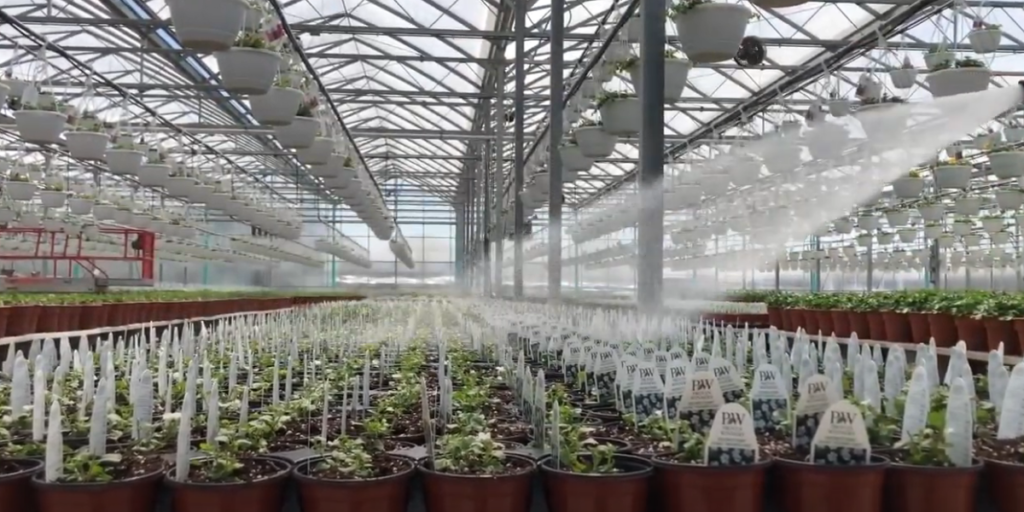In a press release submitted by the Michigan Farm Bureau, the MFB is now asking members and supporters to tell legislators and the state agriculture department that we need their help telling Gov. Whitmer to clarify plant sales are essential agriculture! Act now by texting the phrase MIGREEN to the number 52886 or visiting https://bit.ly/
Unfortunately, Gov. Gretchen Whitmer’s EO 2020-42 announced Thursday not only extended the previous order, but actually expanded previous restrictions, explicitly prohibiting plant sales.
Under a new section of the EO, Whitmer imposed additional restrictions, “Large stores must also close areas of the store that are dedicated to carpeting, flooring, furniture, garden centers, plant nurseries, or paint.”
Michigan Farm Bureau (MFB) is stepping up its efforts, encouraging members and supporters to contact their state representatives, senators, and department of agriculture, urging them to tell Whitmer to issue a clarification to include the retail sale of plants as essential infrastructure, according to MFB President Carl Bednarski.
“Gov. Whitmer’s insistence for continued and expanded restrictions on plant sales runs counter to similar EOs in countless other states, including Illinois, New York, North Carolina, and most recently, nearby Ohio where retail sales of plants are deemed essential agriculture,” Bednarski said.
MFB is now asking members and supporters to tell legislators and the state agriculture department that greenhouse growers need their help in telling Gov. Whitmer to clarify plant sales are essential agriculture! Members and consumers can act now by texting the phrase MIGREEN to the number 52886 or visiting https://bit.ly/
Bednarski said the heightened restrictions within the new EO will devastate an important sector of Michigan agriculture that generates annual sales of $580 million to $700 million in retail sales, and employs more than 9,000 workers.
“If these farms and garden centers miss their primary opportunity to sell nursery stock, flowers and vegetable plants to consumers who are requesting it, growers and their employees could face an entire year without income,” he said.
The new focus toward the Michigan Legislature and the Michigan Department of Agriculture and Rural Development (MDARD) is expected to help build awareness of the industry’s concerns.
MFB had launched a similar effort in the days leading up to Whitmer’s extended EO, which generated more than 26,000 messages from farmers and consumers.
In nearby Ohio, which just extended a similar stay-at-home EO on April 2, Gov. Mike DeWine announced the new order specifically included a “Clarification that retail garden centers can remain open but should determine and enforce a reduced capacity to keep customers and employees safe.”
Michigan Greenhouse Growers Council (MGGC) Executive Director Goeff Hansen said the industry is concerned about how the new EO will affect Michigan growers, currently the third-largest production greenhouse industry in the nation.
“The governor’s EO has already had a devastating effect on the Easter plant sales and now there is concern that people will not be able to plant their gardens to be self-sufficient and take pressure off of the retail produce market,” he said.
According to Hansen, MGGC members’ phones are “ringing off the hook” with people wanting to work in their vegetable gardens and getting ready for the growing season. MGGC has been advocating for curbside pickup and delivery options available to the garden centers through MDARD, which unfortunately appears to have fallen on deaf ears. According to Hansen, MGGC never received a response from MDARD Director Gary McDowell or anyone else within the Whitmer administration to a March 25, two-page letter formally requesting plant sales be allowed.
MGGC had, at the request of McDowell, submitted the letter outlining specific procedures from the Center for Disease Control and Prevention (CDC) and state and local health authorities that would be followed by growers and retail garden centers, if plant sales were allowed.
“Many of the products carried by garden retailers are agricultural, like seeds and edible plants. Others are necessary tools and supplies,” MGGC wrote. “Together they are essential to maintaining a healthy living environment. In many communities, the garden retailer may be the only outlet where consumers have access to essential supplies for growing, gardening, maintaining or repairing their residences.”
MGGC’s letter to McDowell also noted that New York, one of the hardest-hit state’s in the COVID-19 crisis, specifically spelled out that the care and sales of plants are essential, noting:
“Horticultural Operations: For purposes of Executive Order 202.6/PAUSE Executive Order, “Essential Production, movement, maintenance, and sale of vegetable plants, nursery stock, trees, plants, and flowers at greenhouse and nursery operations. • Tree and shrub trimming and removal for disease, safety, and public health purposes. • The placement and ground maintenance of sod, landscaping plants, flowers, ornamentals, and trees on residential and commercial grounds. • Transportation necessary to meet any of the above functions.
“Because of these considerations, the Michigan Greenhouse Growers Council urges the Michigan Department of Agriculture and Rural Development to consider garden retailers among those operations determined to be ‘essential’ retail outlets that can exercise the option to remain open to support their communities during these trying times,” MGGC wrote.
If you’d like to take action, Michigan Farm Bureau is asking members and supporters to tell legislators and the state agriculture department that we need their help telling Gov. Whitmer to clarify plant sales are essential agriculture! Act now by texting the phrase MIGREEN to the number 52886 or visiting https://bit.ly/
Submitted by the Michigan Farm Bureau


